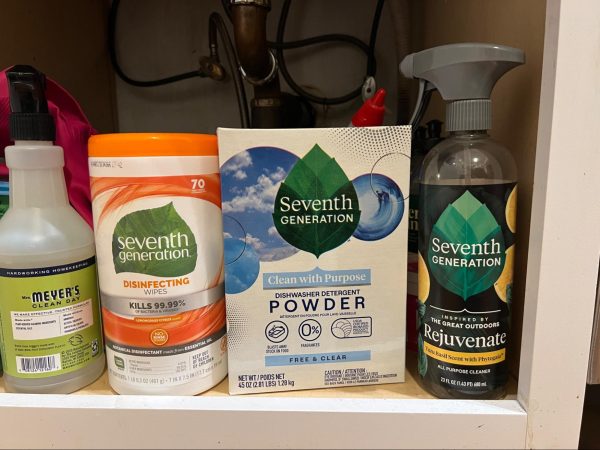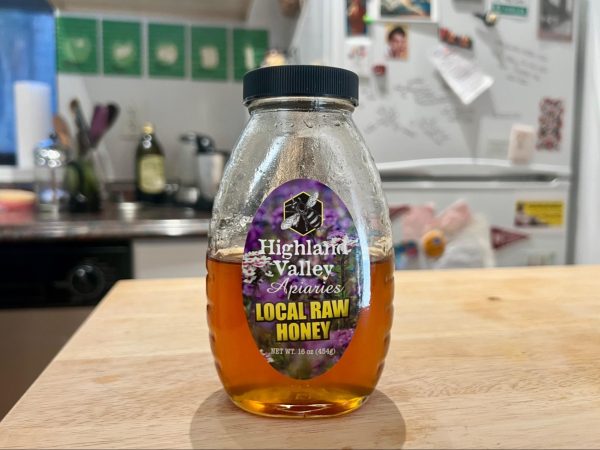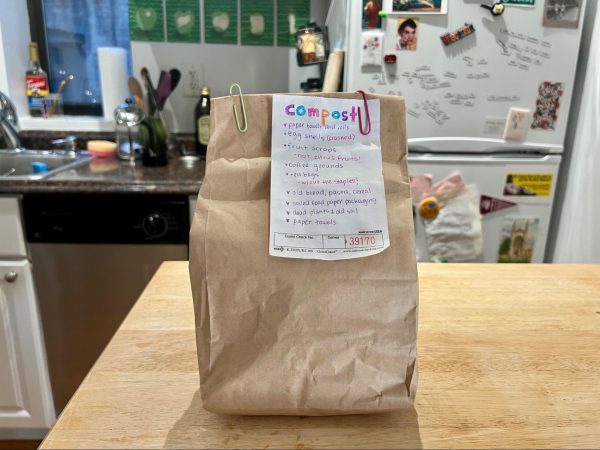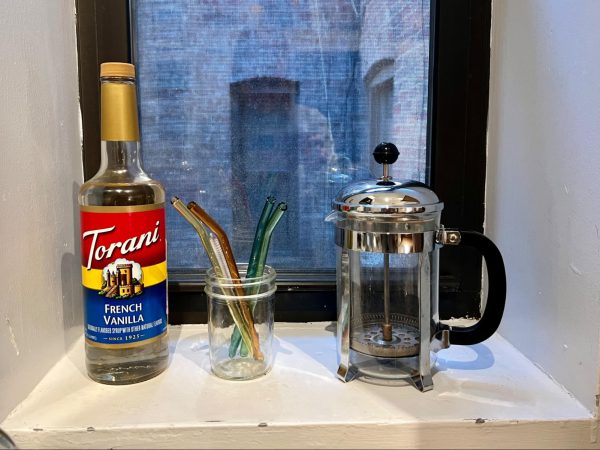2024 is the first year that global temperature averages surpass the 1.5 degree Celsius increase that the Paris Climate Agreement pledged to prevent 10 years ago. As we enter the new year, it is imperative to reflect on both communal and personal environmental responsibility. As a college student, here are some tips that I have found helpful for the planet — as well as my wallet and health:
-
Stop using AI.
According to AP News, a single conversation with ChatGPT uses about 16 ounces of fresh water. The sizable quantity is because the servers require cooling for the massive amounts of data they process. Whether you use ChatGPT for convenience or because your professor said it’s alright, scaling back your use can make a huge impact.
-
Learn about religions and cultures other than your own.
We don’t always realize that we live in echo chambers, and interacting with content and people outside of your usual horizons boosts knowledge and compassion. It is also much easier to have dialogue around the issues of climate change when you have a better understanding of your intended audience’s perspective.
-
The seventh generation principle.
You may have heard about the cleaning brand, but the concept originated as a Haudenosaunee principle. The Haudenosaunee are an Indigenous nation, sometimes referred to as Iroquois, that live along the East Coast of the United States and Canada. The seventh generation principle states that “the decisions we make today should result in a sustainable world seven generations into the future.” Though the brand can do more to support the community from which its name originates, they implement sustainable concepts such as zero waste packaging, use certified sustainable fibers and give full ingredient disclosure, according to their website.

A lineup of cleaning products under my kitchen sink. (LAURA OLDFATHER/THE OBSERVER) -
Eat more plants.
I’ve found adding plants to my diet is more helpful than trying to cut other things out. I know that I usually don’t eat enough fruits and vegetables, and though those are not cheap groceries, other plants like legumes sell at a much lower price point and pack a lot of protein. If you’re looking for inspiration, check out The Veggie, a weekly newsletter from the New York Times that sends vegetarian recipes.
-
Buy local animal products.
With the money you will save by buying more beans, try to prioritize buying locally sourced meat and dairy. Buying local animal products decreases transportation emissions and gives money back to your community. In addition, local honey can help with seasonal allergies, and raw honey contains more nutrients than its processed counterpart.
-
Eat more organic food.
According to Columbia Climate School, “The lack of pesticides and wider variety of plants enhances biodiversity and results in better soil quality and reduced pollution from fertilizer or pesticide run-off.” The lack of chemicals is important for the health of both the planet and your body, and I like to think of the additional cost as an investment in that. Scrubbing your produce extra well when you can’t buy organic also makes a difference.

Trader Joe’s sells local honey from the Highland Valley. According to the back of the glass jar, Highland Valley Apiaries’ “focus is to produce pure Local Raw Honey in rural areas of PA, NY, and NJ away from commercial agriculture and pesticides.” (LAURA OLDFATHER/THE OBSERVER) -
Sustainably source your energy.
While college students living in apartments cannot reasonably purchase solar panels, there are still cleaner energy options. If you live in New York City with ConEdison as your provider, you can sign up for Green Mountain Energy, a retailer that sources your energy from wind farms upstate rather than nonrenewable sources. Though it may be different for others, I have noticed no change in my energy bills since switching over six months ago.
-
Compost.
Composting will be mandatory in New York City, and now is the time to start. Because I live in a small apartment, my roommate and I have found that the best solution is to keep our compost in the freezer before disposing of it in the orange bins that dot the streets. We bought a pack of brown bags (the kind you would pack your lunch in for a field trip) and always double-bag our scraps to avoid leakage. The NYC Compost App allows you to see all the bins in your area and unlock a bin when you are nearby to drop them off. Composting prevents organic waste from going into landfills and is used to build healthier soil. The compost from New York City is taken to facilities in New Jersey and Staten Island and is aerated and turned over in facilities until it is “is then either sold to landscapers or given away to residents and community groups,” according to the New York Times.

The compost bag my roommate and I keep in our freezer to avoid a bad smell. We reuse the clips and tips sheet each time we compost the bag. (LAURA OLDFATHER/THE OBSERVER) -
Unplug anything that’s not in use.
According to the National Resource Defense Council, devices that are unused but plugged in can cost hundreds of dollars per year in electricity bills. Unplug devices when not in use, particularly phone and computer chargers, which consume a lot of idle energy.
-
No sober Ubers.
This money-saving tip popularized on TikTok is also great for the planet. New York City has one of the best public transit systems in the United States, with trains and buses that can get you almost anywhere. Utilize this infrastructure! Any map apps as well as the MTA Transit app provide timing and route information.
-
Make your coffee at home.
Making your morning beverages reduces plastic waste, saves money and can be a way to experiment and indulge your creativity. Preparing more of your own food does the same! If you’re feeling unsure, browse the internet for recipe ideas, or browse your pantry to see what you have already.

The DIY coffee station in my kitchen windowsill. (LAURA OLDFATHER/THE OBSERVER) -
Glass straws.
With plastic straws being wasteful, paper straws getting soggy and metal straws making it impossible to see if the inside is dirty, it can be hard to know what to do. The perfect solution is glass straws, which are see-through and come in a variety of colors. I like them so much that when I buy a beverage I wait until I’m home to drink it with my straws.
-
Use the things you already own.
Project Pan is another sustainable trend on TikTok that encourages people to use up the makeup they have rather than constantly buying more. With so many influencers posting about the newest products, this movement is a refreshing take. The name “project pan” refers to the phenomenon of hitting the metal pan at the bottom of a makeup palette. This trend applies to all products from nail polish to perfumes and colognes, and aims to decrease both consumption and clutter.
-
Buy items meant to last.
Buying cheap items often leads to them breaking down quickly. While buying nice items can come with a daunting price for college students, thrift stores are a great option. Living in Manhattan, I’ve found some of the best quality thrift stores with the best prices to be located in other boroughs or out of the city entirely in New Jersey. Classic and generally reliable options include Goodwill and Buffalo Exchange, both of which have many locations. Thrift stores require more effort on the front end, but can result in good quality, unique items for a fraction of the new price.
-
Facebook marketplace.
Along the same lines, my friends and I have gotten furniture, birthday gifts, plants and more from Facebook Marketplace, a social media app feature that allows users to list, sell and buy items near them. This is another way to find good quality items at great prices, or make a little extra cash while decluttering. Most neighborhoods also have a “Buy Nothing” Facebook group, that encourages gifting unneeded items to those in your community who might need specific things, and vice versa.
-
Reusable period products.
Menstruation and menstruation products can carry a lot of false conceptions and stigma that disproportionately harm women. In addition, standard period products produce a lot of waste and have to be continually repurchased. However, there are several options for reusable alternatives that are safe, healthy and better for the environment as well as your pockets. Depending on each person’s preferences, options like cotton pads or silicone menstrual cups come at a slightly higher upfront cost but have years-long warranties.
-
Give better gifts.
As we enter into the holiday season, intentional gift giving is a must. Unwanted gifts bring clutter, stress and waste, so try thrifting presents, making presents or gifting experiences for your loved ones. My favorite gifts to make are painted lighters and clay fridge magnets, and my favorite experiences to gift are concert tickets and massage appointments. In my family, I started a tradition of using anything but wrapping paper for Christmas, and our gift cases range from The Observer issues to matchless socks.
While not everything that works for me will work for you, I hope that the list can inspire small but sustained efforts of change. We all have our own areas to work on, but implementing lifestyle change helps us care for the earth and each other.

